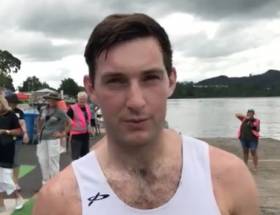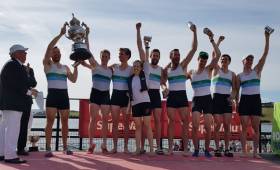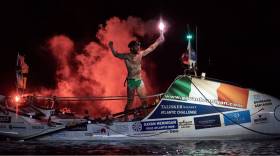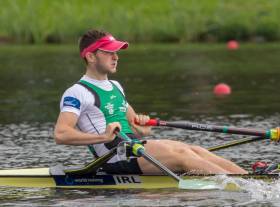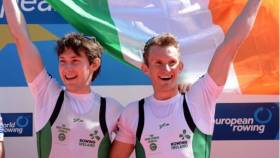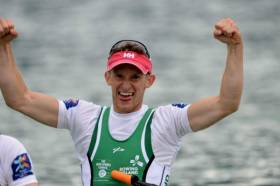Displaying items by tag: rower of the month
Sanita Puspure is Afloat Rower of the Month
#Rowing: The Afloat Rower of the Month for June is Sanita Puspure. The world champion in the single sculls became the European champion with a gutsy performance in the final at Lucerne.
Puspure pushed into the lead after just 500 metres and was still leading at the finish. The home challenge, in the shape of Jeannine Gmelin closed to within less than a second of Puspure at the line but could not get past her. Mirka Topinkova Knapkova of the Czech Republic, the 2012 Olympic champion, showed outstanding speed in the last 500 metres to finish third.
Rower of the Month awards: The judging panel is made up of Liam Gorman, rowing correspondent of The Irish Times and David O'Brien, Editor of Afloat magazine. Monthly awards for achievements during the year will appear on afloat.ie. Keep a monthly eye on progress and watch our 2019 champions list grow.
Award Follows Paul O'Donovan's Premier Achievement
#Rower of the Month: The Afloat Rower of the Month for February is Paul O’Donovan. The Skibbereen quartet of Mark O’Donovan, Shane O’Driscoll, Paul O’Donovan and Gary O’Donovan warmed slowly to their task in competing in the New Zealand Rowing Championships. The arrival of coach Dominic Casey helped. When finals came around, they won a bronze medal as a four. But topping this achievement was that of Paul O’Donovan in the Premier Single Sculls. The lightweight world champion mixed it with two of the top heavyweights in the world: O’Donovan finished third, just a few boat lengths behind Robbie Manson, who in 2017 set the world’s fastest time, and ahead of Olympic champion Mahe Drysdale.
The achievement makes Paul O’Donovan the Afloat Rower of the Month.
Rower of the Month awards: The judging panel is made up of Liam Gorman, rowing correspondent of The Irish Times and David O'Brien, Editor of Afloat magazine. Monthly awards for achievements during the year will appear on afloat.ie. Keep a monthly eye on progress and watch our 2018 champions list grow.
https://www.facebook.com/WorldRowing/videos/10160199271930651/
Commercial Eight the Afloat Rowers of the Month
#Rowing: July 2017 was one of the most successful months for Irish rowing. There were multiple medals at international regattas: the World Cup in Lucerne, gold and bronze; the Under-23 World Championships, two bronze medals; Coupe de la Jeunesse, five gold medals; six wins at the Home International Regatta; a good showing by the Clonmel junior quadruple at Henley Royal Regatta.
The Irish Rowing Championships regatta was the biggest ever. NUIG took nine titles. Enniskillen won the junior women’s and men’s eights (and fours) and the junior 16 women’s and men’s eights. Three Castles, with two wins, and UCC with a breakthrough win at novice level, had reasons to celebrate. Cork Boat Club and Bann could boast the champion junior single scullers as part of their three wins.
Skibbereen’s top-rank rowers, usually ruled out by the international programme which sees them bring glory to their country, came to the show and helped the club to seven titles. Two Olympians, Sanita Puspure and Claire Lambe, took titles for Old Collegians and also helped UCD/Old Collegians to take the women’s senior eights crown. UCD had also won the women’s senior pair and the men’s intermediate eight.
Year after year, the men’s senior eights final is the highlight of the Championships. This time out the Skibbereen eight could call on some of the best lightweight rowers in the world. The race was magnificient. In the closing stages, NUIG looked like they might revive the days of their domination; Skibbereen charged to the line. Commercial won. A crew of club rowers had put everything on the line and gained their reward.
They are the Afloat Rowers of the Month.
Rower of the Month awards: The judging panel is made up of Liam Gorman, rowing correspondent of The Irish Times, and David O'Brien, editor of Afloat magazine. Monthly awards for achievements during the year will appear on afloat.ie. Keep a monthly eye on progress and watch our 2017 champions list grow.
Hannah Scott is Afloat Rower of the Month for February
#Rowing: Hannah Scott is the Afloat Rower of the Month for February. The Bann girl topped the rankings at the Ireland Assessment. Her time of 25 minutes and 32 seconds for the six kilometre course at Lough Rynn in Leitrim gave her a remarkable mark of 89.10 per cent of projected world best time for a junior woman over this distance.
Scott was part of the Ireland junior quadruple which won a bronze medal at the Coupe de la Jeunesse in 2016. In that crew, she was partnered by Lucy Taylor, Fiona Chestnutt and Margaret Cremen.
Rower of the Month awards: The judging panel is made up of Liam Gorman, rowing correspondent of The Irish Times, and David O'Brien, editor of Afloat magazine. Monthly awards for achievements during the year will appear on afloat.ie. Keep a monthly eye on progress and watch our 2017 champions list grow.
Ocean Rower Gavan Hennigan is Afloat Rower of Month
#Rowing: The Afloat Rower of the month for January is Gavan Hennigan. The Galway man set a new Irish record for a solo row across the Atlantic ocean. He crossed from La Gomera in the Canary Islands to Antigua in the West Indies in 49 days 11 hours 37 minutes and 21 seconds, the fastest solo row for this course. He finished a remarkable third in the 12-boat Talisker Whisky Atlantic Challenge. He beat all the boats except two fours and won a stirring battle with the three-man crew of American Oarsmen.
Rower of the Month awards: The judging panel is made up of Liam Gorman, rowing correspondent of The Irish Times, and David O'Brien, editor of Afloat magazine. Monthly awards for achievements during the year will appear on afloat.ie. Keep a monthly eye on progress and watch our 2017 champions list grow.
Single and Double Success Brings O'Donovan Afloat Honour
#Rowing: Paul O’Donovan is set to have an extraordinary August, competing at the Olympic Games in Rio de Janeiro and the World Rowing Championships in Rotterdam. He is named the Afloat Rower of the Month for his achievements in June. Paul and his brother, Gary, continued their impressive run in the lightweight double sculls. They took fourth in the World Cup regatta in Poznan, Poland. They placed ahead of Britain, who were silver medallists at the World Championships in 2015, in both the repechage and the final. Germany, who were sixth last year, could not qualify from the repechage, which was won by Ireland in the fastest time they have done in a race. They head off to a block of training in Spain having moved from 11th in the world last year to a ranking of 5th in the bookies’ odds for Rio.
Paul O’Donovan has been chosen to compete in the lightweight single in Rotterdam. In a shoot-out with Gary at Cork Regatta in the senior single he proved his credentials with a big win. Despite being a lightweight, he is the best single sculler in Ireland.
Rower of the Month awards: The judging panel is made up of Liam Gorman, rowing correspondent of The Irish Times, and David O'Brien, editor of Afloat magazine. Monthly awards for achievements during the year will appear on afloat.ie and the overall national award will be presented to the person or crew who, in the judges' opinion, achieved the most notable results in, or made the most significant contribution to rowing during 2016. Keep a monthly eye on progress and watch our 2016 champions list grow.
#Rowers of the Month: Paul O’Donovan and Gary O’Donovan have had a remarkable few weeks, and are the Afloat Rowers of the Month for May. The brothers from Cork came into the month having taken silver at the first World Cup in Italy and they won gold in the lightweight double sculls at the European Championships in Brandenburg in Germany - the first Ireland rowing crew to become European Champions.
They faced a tough test to reach the final of the second World Cup in Lucerne, but got there through a semi-final won by Britain’s Will Fletcher and Richard Chambers, the world silver medallists from 2015. In the final, the Ireland crew finished fourth. They put Britain behind them and finished just behind the three world champions from the last three years: France (2015 champions), Norway (2013) and South Africa (2014).
Rower of the Month awards: The judging panel is made up of Liam Gorman, rowing correspondent of The Irish Times, and David O'Brien, editor of Afloat magazine. Monthly awards for achievements during the year will appear on afloat.ie and the overall national award will be presented to the person or crew who, in the judges' opinion, achieved the most notable results in, or made the most significant contribution to rowing during 2016. Keep a monthly eye on progress and watch our 2016 champions list grow.
Gary O'Donovan is Afloat Rower of the Month
#Rower of the Month: Gary O’Donovan is the Afloat Rower of the Month for March. The Skibbereen man had to compete in the lightweight single scull at the Ireland trials after his brother and crewmate, Paul, pulled out ill. Gary set excellent times, showing how much he has improved individually, in addition to being half of the crew of the lightweight double which will compete in international events in Europe in the summer and the Olympic Games in Rio de Janeiro in August.
Rower of the Month awards: The judging panel is made up of Liam Gorman, rowing correspondent of The Irish Times, and David O'Brien, editor of Afloat magazine. Monthly awards for achievements during the year will appear on afloat.ie and the overall national award will be presented to the person or crew who, in the judges' opinion, achieved the most notable results in, or made the most significant contribution to rowing during 2016. Keep a monthly eye on progress and watch our 2016 champions list grow.
Rix and Byrne are Afloat Rowers of the Month
#Rowers of the Month: The Afloat Rowers of the Month for November are Barney Rix of Portora and Ronan Byrne of Shandon. The two young men set new Irish records in indoor rowing. Byrne set a new junior record of six minutes 16.9 seconds at the Provinces Indoor Championships in Limerick. Rix, who had won the junior section at the Irish Indoor Championships early in the year, competed just two days after the Limerick test in Enniskillen – and lowered the record by .1 of a second to 6:16.8.
Rower of the Month awards: The judging panel is made up of Liam Gorman, rowing correspondent of The Irish Times and David O'Brien, Editor of Afloat magazine. Monthly awards for achievements during the year will appear on afloat.ie and the overall national award will be presented to the person or crew who, in the judges' opinion, achieved the most notable results in, or made the most significant contribution to rowing during 2015. Keep a monthly eye on progress and watch our 2015 champions list grow.
Paul O'Donovan is Afloat Rower of the Month
#Rower of the Month: The Afloat Rower of the Month for October is Paul O’Donovan. The UCD lightweight was quite outstanding at the Ireland trial. He was by far the fastest single sculler, setting a time of seven minutes 21.24 seconds in the heat and 7:22.63 in the final. Paul O’Donovan, in combination with his brother Gary O’Donovan, has been rightly feted for qualifying the Ireland lightweight double for the Olympic Games, and he has continued to set an exemplary standard.
Rower of the Month awards: The judging panel is made up of Liam Gorman, rowing correspondent of The Irish Times and David O'Brien, Editor of Afloat magazine. Monthly awards for achievements during the year will appear on afloat.ie and the overall national award will be presented to the person or crew who, in the judges' opinion, achieved the most notable results in, or made the most significant contribution to rowing during 2015. Keep a monthly eye on progress and watch our 2015 champions list grow.


























